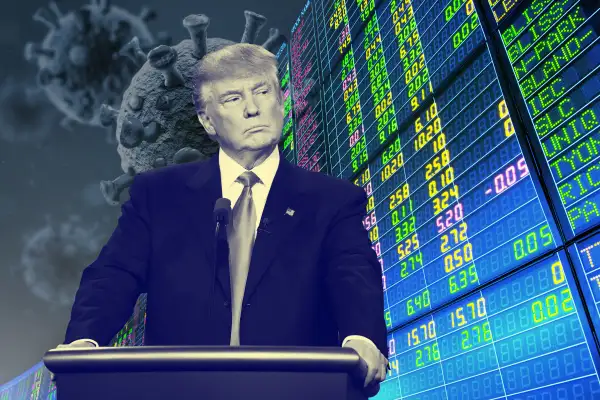Trump's Positive COVID-19 Test Is Rattling Markets. Where Are Stocks Headed Next?
Money is not a client of any investment adviser featured on this page. The information provided on this page is for educational purposes only and is not intended as investment advice. Money does not offer advisory services.

News early Friday morning that President Donald Trump and the First Lady tested positive for COVID-19 shocked many Americans still reeling from pandemic-induced economic hardship and uncertainty surrounding a presidential election just a month away.
While Trump is so far said to be in good health and spirits, financial markets immediately reacted to the news, with the Dow down 0.6%, or 155 points, to 27,662 in early trading.
However, prices for benchmark 10-year U.S. Treasurys, which investors regard as a safe haven asset, also slipped, sending yields (which move in the opposite direction of prices), up to 0.684%. Gold edged down, 0.5%, to $1,908 a ounce. Oil slumped about 5% to $36.76 a barrel.
In addition to Trump's COVID test, markets digested news from the Labor Department that the U.S. added 661,000 jobs in September, below the 850,000 forecast by economists polled by financial data firm Refinitiv. The report, the last expected before November's presidential election, suggests the late summer economic recovery is slowing.
What Could Happen Next
Markets could ultimately shrug off Trump's positive COVID test, so long as he remains relatively healthy, investors said Friday.
“If Trump is just positive but not ill, markets could rebound,” Patrice Gautry, chief economist at UBP in Geneva told Bloomberg. “Trump may continue to manage from the White House, so economically the damages are limited as long as he is just positive but not really ill.”
Trump is not the first world leader to contract the disease.
U.K. Prime Minister Boris Johnson came down with COVID in late March, ultimately causing him to be hospitalized and unable to lead for a month. U.K. stocks fell more than 5% on news of Johnson's illness, although it took place at a time when financial markets were already being riled by COVID news across the globe. U.K. stocks gradually regained lost ground as Johnson convalesced through April.
Brazilian stocks largely ignored President Jair Bolosonaro's positive COVID test in July, rising steadily throughout the month.
What You Should Do
Of course, there is no guarantee that what happens next in the U.S. will follow the script in either the U.K. or Brazil. And neither country was on the eve of a major election when their leader fell ill. (How Trump's illness will affect his chances of re-election, assuming he remains relatively healthy, is anyone's guess.)
That said, your aim as an investor should always be to look toward the long term: Not what happens in Washington this month or next, but the prospects for the U.S. economy in three years or, better yet, 10.
In other words, while the prospect of the U.S. president contracting a dangerous and potentially deadly illness is certainly an unsettling one for the nation, as always, don't let any fears affect your investing decisions.
More from MONEY:
What Will Happen to the Stock Market if There's No Clear Winner on Election Night?
Bank Stocks Are Offering Yields of Nearly 4%. But Are They Safe?
